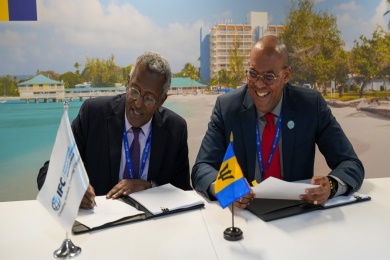IFC and Government of Barbados Developing Wind Farm Inclusively with Community Involvement

Bridgetown, Barbados, May 16, 2024— To mitigate the impacts of climate change and to diversify its energy mix while reducing the cost of energy in the long-term, the Government of Barbados is boosting its onshore wind generation capacity with the support of the International Finance Corporation (IFC).
At COP28 in December 2023, the Government retained IFC as a transaction advisor to help structure a public-private partnership (PPP) for the 30 to 50 MW Lamberts Wind Farm, in the parishes of St. Lucy and St. Peter. As part of the agreement, IFC will support the Government to hold a competitive tender process to identify a qualified private sector partner that will develop and operate the wind farm in line with international standards.
To gain first-hand experience of a project similar in scale to the one planned for Lamberts, in April 2024, the Ministry of Energy and Business (MEB) and IFC organized a tour of the BMR Jamaica Wind Project, a 36 MW onshore wind farm in St. Elizabeth Parish, Jamaica. The BMR project was financed by IFC and reached commercial operations in 2016 as the country’s first IPP-led wind farm. Lamberts community members joined the tour alongside representatives from the MEB, IFC, the Barbados Light & Power Company, and the National Petroleum Corporation of Barbados.
“Barbados is a leader in setting ambitious climate-smart energy targets, and we continue to focus our efforts on meeting these targets. So far, we have seen an incredible solar PV-driven response from the market to our targets, and so we are excited to have the development of our first large sale wind project. But reaching our targets is also about people and in everything we do, inclusion of people and communities must matter. Our tour of the BMR wind farm is a case in point— by involving local community members, we can utilize new technologies and realize economic benefits in a way that brings everyone along,” said Lisa R. Cummins, Minister of Energy and Business in Barbados.
As part of the tour, the team met with representatives from Jamaica’s Ministry of Science, Energy, Telecommunications and Transport, JPS – Jamaica’s electric utility company– and the Office of Utilities Regulation to explore how they’re working to achieve Jamaica’s goal of achieving 50% renewable energy by 2030.
“Touring the BMR wind farm was incredibly helpful. I was able to speak to local community members— including farmers, a school principal, and other residents of St. Elizabeth— which provided me with additional background on how wind farms operate and how agricultural activities can carry on after construction is completed,” Anderson Rollock, the Community Liaison Officer for Lamberts Wind Farm project, observed. “I am taking this knowledge back to Barbados where I’m engaging my local community to overcome concerns and emphasize the economic and environmental benefits of wind energy.”
“IFC is pleased to be working with the Government of Barbados on generating more renewable energy, which will help the country reduce its dependence on imported fuels, translate into a more stable energy supply, and lower consumer rates,” said Ronke-Amoni Ogunsulire, IFC Regional Manager for the Caribbean.
IFC has an impressive track record in PPPs. Since 2004, the institution has advised and closed more than 170 PPP projects across developing countries, contributing more than $46 billion in private investment. IFC’s PPPs in the Caribbean include the successful 25-year concession of the Norman Manley Airport and the development of the North Coast Highway Project, both in Jamaica.
About IFC
IFC — a member of the World Bank Group — is the largest global development institution focused on the private sector in emerging markets. We work in more than 100 countries, using our capital, expertise, and influence to create markets and opportunities in developing countries. In fiscal year 2023, IFC committed a record $43.7 billion to private companies and financial institutions in developing countries, leveraging the power of the private sector to end extreme poverty and boost shared prosperity as economies grapple with the impacts of global compounding crises. For more information, visit www.ifc.org.
Stay connected with IFC on social media.
Leave a comment
You must be logged in to post a comment.